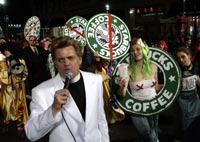“The Shopocalypse is coming! Who will be $aved? Let me exorcise your credit cards! Changellujuah!”

So go the pithy exhortations of “Reverend Billy”—the charismatic, feather-ruffling rebel at the center of the new documentary, What Would Jesus Buy? The film, which opens in limited release this Friday, takes a unique look at the epidemic of over-consumption in America, most egregiously evident during the Christmas shopping season—which begins in earnest next week. Reverend Billy and his “Church of Stop Shopping” are on a mission to apply the WWJD ethos to our shopping habits—forcing audiences to consider the implications (for themselves and for the world) of what they consume.
Lest the name confuse you, it should be made clear: Reverend Billy is not an ordained minister and doesn’t even call himself a Christian. The preacher persona is simply a stage name for Bill Talen, an actor-turned-activist from New York City (via San Francisco). Talen grew up Dutch Calvinist in Minnesota but left the faith as a teenager. He adopted the “Reverend” title in 1997 as a way to creatively protest America’s increasingly excessive consumerism and corporate homogeneity (with Starbucks, Wal-Mart, and Disney being his version of the “axis of evil”). What began as his solitary street “preaching” in Times Square (the “Stonehenge of billboards”) soon became a “ministry” of sorts—the Church of Stop Shopping.
The “Church” is really more of a performance art/activist group—a volunteer nonprofit community comprised of fifty singers and an eight-piece band. Though several members of the “gospel” choir are preachers’ kids, the group does not claim Christian orthodoxy. The songs they sing may sound like holy ghost-inspired Jesus jams (complete with robes, swaying, and hand raising), but the lyrics are more about slamming Starbucks than praising God. Even so, the passion that is evident in the Stop Shopping Gospel Choir is contagious and admirable. Many Christian churches could learn a few things from this secular outfit.
What Would Jesus Buy? documents the Stop Shopping Choir on their cross-country bus tour in the month prior to Christmas 2005. The film, from director Rob VanAlkemade and producer Morgan Spurlock (Super Size Me), is adapted from VanAlkemade’s 2005 documentary short, Preacher With an Unknown God, which won an honorable mention award at the 2006 Sundance Film Festival. WWJB uses the choir’s trip—with protest stops at The Mall of America and a culminating “protest parade” in Disneyland on Christmas Day—as the narrative engine to drive a broader examination of out-of-control consumerism.

I recently chatted about the film with Spurlock, who says it’s a wake-up call for all of us who bow at the altar of consumption: “We’ve become blind to what’s important in our lives. We’ve lost sight of the true message of Christmas.”
The film intersperses clips of Billy and the Choir with interviews and commentaries from experts and everyday consumers. Featured talking heads include academics, authors, psychologists, “shopping addiction therapists,” and a few clergy like Rev. Jim Wallis (who provides some of the most sensible commentary in the whole film). Young children are interviewed about their Christmas wish lists (“an Xbox 360 and a disposable cell phone!”), teenage girls are challenged to find out where and how their favorite clothes are manufactured, and adults are shown recklessly maxing out credit cards the day they receive them in the mail.
In one particularly poignant scene, we see the “Wal-Mart effect” on small-town businesses when an Iowa mom-and-pop clothier describes how hard it is to stay afloat when ubiquitous Wal-Marts undercut his prices. The main streets of America—with homegrown goods that feed money back into local economies—are quickly succumbing to multinational conglomerates and outsourced labor. This, the film argues, is a sign of the “shopocalypse.”
Aside from a few more serious, melancholy scenes, WWJB is more or less a comedy. It’s hard not to laugh at the confused faces of holiday shoppers as a robed choir marches through Abercrombie & Fitch and Victoria’s Secret stores, singing about the impending shopocalypse as hovering security guards call for reinforcements. It’s classic agit-prop theater—using humor and stagy gimmicks to shake things up, entertain, and provoke. It’s a creative brand of protest, certainly, and according to the choir director (and Rev. Billy’s wife) Savitri D, it’s a protest grounded in Christian tradition: “Jesus was preaching within a tradition of theater as activism.”
Though the ultimate message of the film (“to try to shop conscientiously,” according to VanAlkemade) is something all audiences should resonate with, some critics have noted that the film’s playfully sacrilege use of Christian forms and traditions may alienate some audiences. Rev. Billy’s character is clearly modeled after a sweaty, breathy, over-the-top southern televangelist (Billy name drops Jimmy Swaggart) who prances around in polyester suits and occasionally “speaks in tongues” or is “slain by the Spirit.” Catholics might also take offense at some of Rev. Billy’s antics, whether he’s in a makeshift confession booth on a city sidewalk (taking “confessions of shopping sins”) or “baptizing” a baby outside of a Staples.
Yes, it’s condescending. Yes, it cheapens Christianity. But the whole argument of the film is that our commodity culture has already cheapened Christianity. As Spurlock notes, “Reverend Billy may turn off some people, but the strength of the film is not in the man but the message.”

On the other hand, some Christians have praised Rev. Billy for bringing back the radical, “clearing out the money changers” rhetorical style of Jesus. In a recent Sojourners column, renowned Old Testament scholar Walter Brueggemann goes so far as to call Rev. Billy a modern day prophet: “I have no doubt that Rev. Billy is a faithful prophetic figure who stands in direct continuity with ancient prophets in Israel and in continuity with the great prophetic figures of U.S. history who have incessantly called our society back to its core human passions of justice and compassion.”
The question at the heart of the controversy is whether the message of Rev. Billy is helped or hurt by its employment of Christian forms. Is it okay that Billy—who defines himself as “post religious”—calls himself “Reverend” and that his protest group labels themselves a “Church”?
Are they a church? VanAlkemade thinks so. “Billy truly is a real preacher,” notes the filmmaker. “It’s a real church with a real mission.” But what definition of “church” are we talking about here? The Church of Stop Shopping argues that it’s all about a community of like-minded individuals working together on a shared goal. “We have to be more open than just Christian,” notes Savitri D about the group’s inclusive definition of “church.” “It’s all about community. Whatever you are trying to achieve, it helps to have a net of people around you.”
Clearly, the Christianity at play in this film is not an institutional or pious one. But regardless, the message—notes Spurlock—has plenty in common with Christ: “Jesus was a radical guy. He drove the moneychangers out of the temple. I think he would want us to think about what we buy: Where is it made? Is the money going back into the local economy?”
For Spurlock, the goal of cinema—like church—is to bring people together and inspire them to social consciousness. “I would hope that those who watch this film will leave the theater wanting to change. Maybe they will decide to give a real gift this year—like love or compassion.”
In other words, it’s not so much about “Stop shopping!” altogether—a rather logistical impossibility in our society—as it is about looking at your consumerism in terms of your faith. Following one screening, a young woman came up to Spurlock and said, “For the first time in my life, I thought about how I shop as a Christian.” For Spurlock, it’s all about these small steps: “Consumerism can be changed, even if it can’t be stopped.”
Still, the film’s critical perspective is a tough sell. It has had quite the struggle just to find a distributor—especially since Wal-Mart, a major villain in the film, has a 50 percent corner on the nationwide DVD market. And some film festivals have faced sponsor abandonment (Starbucks) due to the inclusion of the controversial film. Thus, a more grass-roots marketing strategy has been employed by the filmmakers in recent months, taking the film on the road for promotional screenings all over the country, including many conservative cities (Colorado Springs, Lubbock) and several specifically Christian events (Cornerstone music festival, the City of Angels Film Festival).
Though Spurlock maintains that the film is meant for “the religious and irreligious viewer,” it is clear that What Would Jesus Buy—with its title and use of Christian lingo throughout—is in a sense directed toward the Christian church. We have strayed far from the spirit of Christmas and the message of Christ, and the confusion is evident all over this film. WWJB may not ultimately provide the “divine intervention” we need, but at least it reminds us of a serious problem.
Photos of Rev. Billy by Fred Askew
Copyright © 2007 Christianity Today. Click for reprint information.










